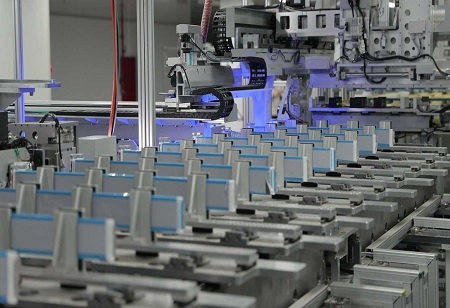
Battery technology plays a pivotal role in the modern world, powering everything from smart phones and electric vehicles to renewable energy storage systems. As the demand for high-performance, long-lasting, and sustainable batteries grows, manufacturers are turning to cutting-edge technologies to alter the battery production process. Kamran Rizvi, Secretary,Ministry of Heavy Industries said in at a seminar on Enabling Policies to Accelerate E- Mobility.The Government is working on another proposal to manufacture 5GW of niche technologies for battery manufacturing. They have acquired the technology of Sodium Ioncells and their plant is also coming up soon. Utilizing solid-state batteries is one such technology that has gained popularity in recent times. Solid-state batteries are a promising alternative to traditional lithium-ion batteries because they offer several advantages. Unlike lithium-ion batteries, solid-state batteries use a solid electrolyte instead of a liquid one, which makes them safer and less prone to overheating or catching fire. They have the potential to store more energy and provide longer-lasting power, which is crucial for electric vehicles and renewable energy systems. Overall, these breakthroughs in battery technology provide excellent prospects for building a greener and more effective energy landscape, which we will delve into further in the subsequent sections.
Solid-State Batteries: Safer and More Energy-Dense
Solid-state batteries represent a groundbreaking advancement in battery technology, offering numerous advantages over traditional lithium-ion batteries. Unlike liquid electrolytes used in conventional batteries, solid-state batteries employ solid electrolytes, which enhance safety and prevent the risk of leakage or thermal runaway. One of the key benefits of solid-state batteries is their potential for higher energy density, enabling devices to run longer on a single charge and significantly extending the driving range of electric vehicles. With their improved thermal stability, solid-state batteries are also better equipped to handle rapid charging without compromising safety. Manufacturers are investing heavily in research and development to overcome challenges such as electrode-electrolyte interface compatibility and manufacturing scalability. As solid-state battery technology matures, we can expect to witness a revolution in portable electronics, electric vehicles, and renewable energy storage solutions.
Lithium-Sulphur Batteries: Boosting Energy Storage Capacity
Lithium-sulphur batteries have emerged as another game-changing technology in the battery manufacturing landscape. They offer significantly higher energy storage capacity compared to traditional lithium-ion batteries. The key to this increased capacity lies in the use of sulphur as a cathode material, which has a much higher energy density than conventional materials. By utilising sulphur, lithium-sulphur batteries can store more lithium ions, leading to higher energy storage capacity. This advancement has implications not only for electric vehicles but also for renewable energy storage, where the ability to store more energy with a smaller footprint is essential. Lithium-sulphur batteries are also more environmentally friendly, as sulphur is abundant and widely available, reducing the reliance on rare and expensive materials used in lithium-ion batteries. Despite their potential, lithium-sulphur batteries face challenges related to stability and cycle life.
AI-Driven Battery Manufacturing: Unparalleled Precision and Efficiency
With its unmatched accuracy and productivity in the production process, artificial intelligence (AI) is making its mark on the battery industry. AI-driven battery manufacturing uses machine learning algorithms to improve battery design, material choice, and manufacturing processes. In order to ensure optimal performance and longevity, AI can analyse enormous amounts of data to pinpoint the materials that are best suited for particular battery applications. Additionally, it can forecast how batteries will behave under various circumstances, allowing manufacturers to create batteries that are specialised for particular use cases. AI streamlines manufacturing procedures during the production phase, lowering waste and enhancing quality assurance. AI-driven systems can produce consistent and high-quality batteries by tracking a variety of parameters in real-time, detecting flaws or deviations, and making quick adjustments. AI technologies will advance as they continue to play a pivotal role in transforming battery manufacturing, making it more efficient, sustainable, and cost-effective.
Customised Electrodes: Enabling Tailored Battery Solutions
Additive Manufacturing, also known as 3D printing, is fundamentally altering the electrode production process in battery manufacturing. Traditionally, electrodes were manufactured through time-consuming and expensive procedures involving multiple steps. It allows for the direct printing of custom-designed electrodes, offering unparalleled flexibility and customization. With 3D printing, manufacturers can create complex electrode structures with enhanced surface areas, promoting faster ion and electron movement within the battery and thus improving performance. It also facilitates the incorporation of novel materials and architectures, pushing the boundaries of battery design and efficiency. This technology is particularly promising for niche applications, such as medical devices and aerospace, where specific battery requirements demand customized solutions. As Additive Manufacturing matures, it will enable the mass production of tailor-made batteries, driving innovation in a wide range of industries.
The battery manufacturing industry is undergoing a rapid transformation, driven by cutting-edge technologies that promise to revolutionize energy storage solutions. As these technologies mature and become more widespread, they will undoubtedly shape the future of battery manufacturing, supporting the global transition to cleaner and more sustainable energy solutions. And as research and development continue, the boundaries of battery technology will be pushed even further, leading to a power-packed future with batteries that drive electric mobility, store renewable energy, and power the world's ever-growing demand for portable devices. By embracing these innovative technologies, battery manufacturers are poised to shape a more sustainable and electrified world.

